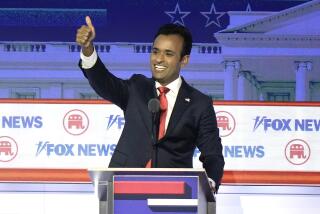MEDIA POLITICS : Press Now Surer Bentsen Won Debate
- Share via
Twenty-four hours after the event, the press seemed even firmer Thursday in declaring Democrat Lloyd Bentsen the victor in the vice presidential debate against Republican Dan Quayle, a consensus pinned largely on instant polls showing a lopsided Bentsen victory.
And, in the absence of a major gaffe by either side, the image played and replayed on television--the moment that already is becoming in a sense the emblem of the debate--was of Sen. Bentsen of Texas telling Sen. Quayle of Indiana, “ . . . You’re no Jack Kennedy,” in response to Quayle’s argument that he has the same level of experience as Kennedy had in 1960.
How Americans ultimately view this debate, and whether Quayle hurts George Bush’s chance to become President, may come down to how much Quayle lost by, and the media coverage suggests that may translate into whether people feel Bentsen’s charge affirms their view of Quayle or seems unfair.
NBC aired that encounter four times on its morning show Thursday, CBS three times. It made the top of most newspaper accounts and was repeated again on all three network news programs Thursday night.
And, on the campaign trail, the real object in the race for control of the media this crucial Thursday was not so much who won the debate--the media seemingly have decided--but what to make of Bentsen’s charge.
President Reagan, for instance, made an appearance on camera to call Bentsen’s line “a cheap shot,” a comment that made two of three networks.
Bentsen, in turn, was seen on all three networks defending the moment and calling it spontaneous: “Quayle kept comparing himself to Kennedy, and he just overreached himself and I got fed up with it.”
This effort to influence media interpretation of debates is considered especially crucial. For, even though debates can be key to elections, typically half the voters don’t watch them and many who do are uncertain what to think. Thus, the media echo, in a sense, can be louder than the sound of the original debate.
The echo for Dukakis was probably better. Not only was Bentsen declared the winner and the Kennedy line repeated, but Dukakis succeeded in getting on the air his attempt to cast Quayle as a negative reflection on Bush:
“My friends,” Dukakis was heard saying on all three networks, “a strong President looks for a strong vice president. Weak candidates look for something else.”
The Dukakis campaign scored another point in the media war Thursday by rolling out two new ads denouncing Quayle, of which all three networks showed parts.
One ad seen on the air noted how often vice presidents become President, the other depicted a fictional band of Bush media advisers saying in a meeting, “Suddenly the words President Quayle even make me nervous,” and, “Is it too late to drop him, bring in Bob Dole?”
Dukakis might be doubly pleased with the play. For, in the handbook of political advertising, an attack ad is lent credibility--and the chance of backlash is diminished--if the ad is seen as part of a newscast. And the object of advertising in a presidential campaign is to reinforce the images seen on the news, something these ads seemed to do, at least this day.
Whether Dukakis succeeds, of course, in winning votes by running against Quayle is a matter on which network correspondents all speculated, CBS’ Lesley Stahl noting that a network poll suggested that 43% of people polled thought the vice president “mattered a lot.”
The image of Bush the day after the debate was the same as usual. He was shown looking youthful, during a jog, and forceful if negative on two networks with a one-liner attacking the Massachusetts weekend furlough program:
“Clint Eastwood’s answer to violent crime is, ‘Go ahead, make my day.’ My opponent’s answer is slightly different. His motto is, ‘Go ahead, have a nice weekend.’ ”
But the correspondents on all three networks noted in their comments that Bush mentioned Quayle infrequently in his speeches. If one accepts the popular notion that what is said on television is less important than what is seen, however, the damage to Bush, at least this day, might have been slight.
More to Read
Get the L.A. Times Politics newsletter
Deeply reported insights into legislation, politics and policy from Sacramento, Washington and beyond. In your inbox three times per week.
You may occasionally receive promotional content from the Los Angeles Times.










